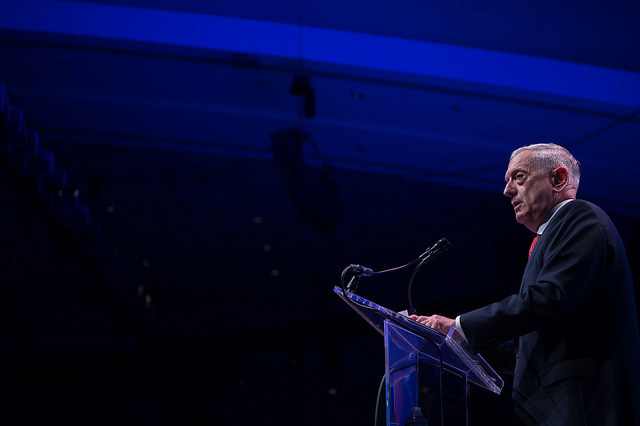American Secretary of Defense James Mattis spoke before the U.S. Army Exposition on Building Readiness in Washington, D.C. on Monday, taking the opportunity to address a number of concerns faced by America’s soldier and civilian populations alike.
The storied former Marine general turned Defense Secretary began by emphasizing something that has been a common trend throughout his tenure at the head of the Pentagon, his unwillingness to see himself or other senior leaders as a more important part of the nation’s overall defense apparatus.
I would just tell you that I recognize that whatever ranks we wear today, or we once wore, in this room, we are all coequal in our devotion to this wonderful, magical experiment that we call America, and to protecting our people and our Constitution.” Mattis said. “And we are coequal. That is one thing that American forces have always had in their ranks: a sense of coequal devotion. So I’m honored to be here with you today, you, who hold the line in this world.”
Mattis went on to identify the three regions of the globe that remain America’s priority, either in terms of ongoing conflict or the potential for conflict to develop, identifying terrorism in the Middle East, Russian aggression in Europe, and North Korea in the Pacific. China was notably absent from his brief rundown. Those threats, according to the Secretary, dictate a three-pronged effort to adapt to the modern buffet of challenges faced by America and its allies, emphasizing the need for a reliable nuclear deterrent, a powerful conventional military force, and the ability to conduct irregular warfare operations.
According to Mattis, the first step toward accomplishing that is a matter of mentality.
First, everything we must do must contribute to the increased lethality of our military. We must never lose sight of the fact that we have no God-given right to victory on the battlefield.”
The second facet of his strategy called for a resurgence in alliance building. Secretary Mattis listed a number of partnerships, coalitions, and alliances the United States has been an active participant in throughout his as-yet short stint at the Pentagon, offering up credit to Secretary Tillerson and glossing over the new partnerships and alliances he’s established in the Pacific with nations like the (arguably unlikely) Vietnam.
Mattis’ third area of focus had to do with budgeting. Although he called on Congress to approve the defense budget and begin playing a more active role in leading the nation, he also called on the military to increase fiscal efficiency and to develop harder lines of accountability for the tax payer’s dollar.
We are taking aggressive action to reform the way we do business, and to gain and to hold the trust of the Congress and the American people, that we are responsible stewards of the money allocated to us, and that it translates directly, every dollar, into the defense of our country and what we stand for.”
The man often heralded as the “Warrior Monk” due to the combination of mentality and his affinity for books then listed some suggested reading material for those who may want to develop a stronger understanding of his mindset as the Defense Secretary.
Now, if you want to know where I see modern war trending, I just ask you to reread General Milley’s remarks from a year ago at this very convention. If you want a reminder of war’s primitive, atavistic, and unrelenting nature, reread Fehrenbach’s ‘This Kind Of War.’ If you want to see why I believe command and feedback must supplement our approach to command and control, read ‘Rules of the Game’ by Gordon. If you want to know where I come from in terms of strategy, read ‘The Future of Strategy’ by Colin Gray, the most near-faultless strategist alive today.” Mattis listed.
“And most importantly, when it comes to you willing and magnificent soldiers, those from General George Washington to today carry our hopes on your shoulders, I say that you need only follow the Army creed we just all saw on the screen and recited.”
When he was done speaking, the Secretary took questions from the audience, which concluded with concerns about the potential for war with North Korea. He made it clear at the onset that he “doesn’t know what the future holds,” but did cite international support for the U.S.-led effort to denuclearize the peninsula as an indicator that diplomacy remains the driving force behind America’s current posture in the region.
He did, however, counter that optimism with a reminder to the soldiers present that the Army’s role in this effort is to stand ready to fight.
The international community has spoken, but that means the U.S. Army must stand ready. And so, if you’re ready, that’s your duty at this point in time. And I know the Army will always do its duty.”
Image courtesy of the Department of Defense










COMMENTS